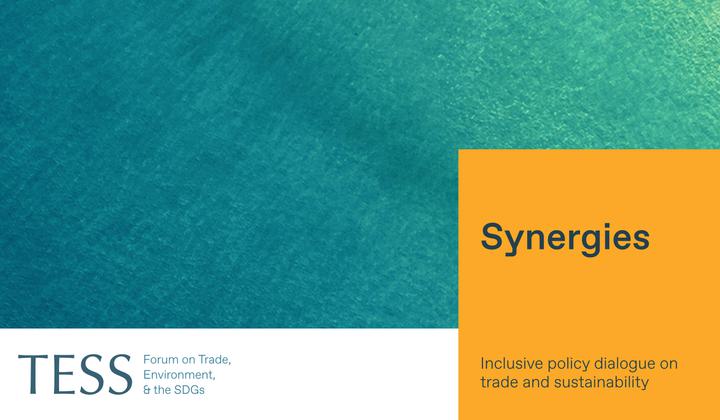As the climate crisis deepens and governments gather at COP28, there is growing attention to the relevance of cooperation on trade and trade policies to the global climate agenda. In the multilateral setting, a range of governments have noted the need to foster more effective multilateral dialogue on the nexus of trade, climate, and sustainable development, including through a focus on best practices and principles as a way to bolster shared understandings and cooperation. As a contribution to such discussions, TESS convened a diverse group of eminent legal experts to provide independent guidance on principles of international law relevant for consideration in the design and implementation of trade-related climate measures and policies. This commentary introduces the group’s report, the principles it addresses, and the rationale behind the initiative.
Climate change presents unprecedented challenges and requires an urgent, ambitious global response at speed and scale. At the international level, governments recognize the climate crisis as a global threat to the environment and socio-economic welfare in all countries, which requires enhanced international cooperation. Governments also recognize that tackling the climate crisis requires ambitious and rapid transformations in the way that we produce and consume goods and services. In this context, there is growing attention to the role of trade and trade policies in the transition to a low-carbon economy, including both calls and efforts to harness “trade, trade policy, and international trade cooperation in addressing climate change.”
Trade-related climate measures are among the policy tools that governments are increasingly using to address climate change. Such trade-related climate measures and policies—including border charges and restrictions, internal taxes, regulations, standards, and subsidies—have both climate change and trade dimensions.
At a time when states are considering trade-related climate measures and policies—and amidst rising political tensions about some of these measures—our report aims to offer independent guidance for governments and stakeholders on principles of international law that are relevant for consideration in the design and implementation of trade-related climate measures.
A core insight of our work is that trade-related climate measures and policies should be approached as legal hybrids. We see trade-related climate measures as implicating a number of areas of international law. More specifically, the rationale, design, and the debates about these measures draws from different international law regimes, including those relating to the environment generally, climate change specifically, and international trade, along with the rules and principles of general international law, international human rights law, and international commitments to sustainable development.
To this end, in the report, the group addresses a set of recognized principles of international law that we deem especially relevant for consideration in the design and implementation of trade-related climate measures and policies. In addition to highlighting the relevance of these principles, our report aims to provide governments with some general guidance, which we hope could be useful in the design and implementation of trade-related climate measures and policies, recognizing that the relevance of principles will depend on the type of measure and context.
We address the following principles in detail in the report itself: sovereignty; prevention; cooperation; prohibition of arbitrary and unjustifiable discrimination; sustainable development, equity, and common but differentiated responsibilities and respective capabilities; and transparency and consultation.
Principles Addressed in the International Legal Expert Group Report

Note: CBDR-RC stands for common but differentiated responsibilities and respective capabilities.
The set of principles that we address in the report is in no way intended to be exhaustive. We selected the principles following careful review of a broad range of possible principles, selecting those that we considered to be particularly relevant to, and deserving of consideration in, the design and implementation of trade-related climate measures and policies. In discussing them, we caution that we do not intend to make any definitive statement as to their legal status, including in the context of any particular international law regime. The group recognizes that the principles set out in the report may not have equal standing in international law. Nor does the order in which the principles are presented in the report suggest any particular hierarchy among them. The report also does not address the application of the principles to any particular measures, whether to determine their legality or otherwise.
We present the principles in a general manner, recognizing that they potentially apply to a wide range of trade-related climate measures and policies, while acknowledging that each principle may apply differently depending on the specific measure at issue, the particular context, and other relevant factors.
With this in mind, we analyse the principles in a way that presents them as cumulative (governments should consider all of these principles when they design and implement trade-related climate measures and policies) and simultaneously applicable, in a mutually supportive and coherent manner, giving full effect to all relevant parts of international law, insofar as possible. Our commentary recognizes the difficulties involved in achieving such coherence and adopts a modest reflective posture, rather than a prescriptive approach, to the implications of the principles we identify.
During our work, experts within our group highlighted the need to discuss reforms, updates, or clarifications on a range of different aspects of international law in order to support the global response at the speed and scale called for by the climate crisis. While recognizing the scope for climate action within existing trade and climate rules, the expert group agreed on the need to encourage critical reflection and dialogue on potential developments of international law to support climate action, both to promote trade that can further collective climate goals and to discourage trade that undermines them, all while fostering sustainable development.
We hope that our reflections on the principles may play a useful role in further discussion around the design and implementation of trade-related climate measures and policies, providing a common reference point to inform and foster mutual understanding, dialogue, and international cooperation on trade-related climate measures and policies in the context of sustainable development priorities.
-----
The International Legal Expert Group on Trade-Related Climate Measures and Policies drew together leading international legal experts from the climate, environment, trade, and general international law communities in both developed and developing countries, participating in their personal capacities. The full list of experts is available here.
This article is drawn from the expert group report on Principles of international law relevant for consideration in the design and implementation of trade-related climate measures and policies.
-----
Synergies by TESS is a blog dedicated to promoting inclusive policy dialogue at the intersection of trade, environment, and sustainable development, drawing on perspectives from a range of experts from around the globe. The editor is Fabrice Lehmann.
Disclaimer
Any views and opinions expressed on Synergies are those of the author(s) and do not necessarily reflect those of TESS or any of its partner organizations or funders.
License
All of the content on Synergies is licensed under a Creative Commons Attribution-NonCommercial-ShareAlike 4.0 International (CC BY-NC-SA 4.0)
license. This means you are welcome to adapt, copy, and share it on your platforms with attribution to the source and author(s), but not for commercial purposes. You must also share it under the same CC BY-NC-SA 4.0 license.
If you would like to reuse any material published here or if you have any other question related to Synergies, send an email to fabrice.lehmann@graduateinstitute.ch.
Principles for the Design of Trade-Related Climate Measures and Policies
This Synergies article is part of our initiative on principles for the design of trade-related climate measures and policies.




